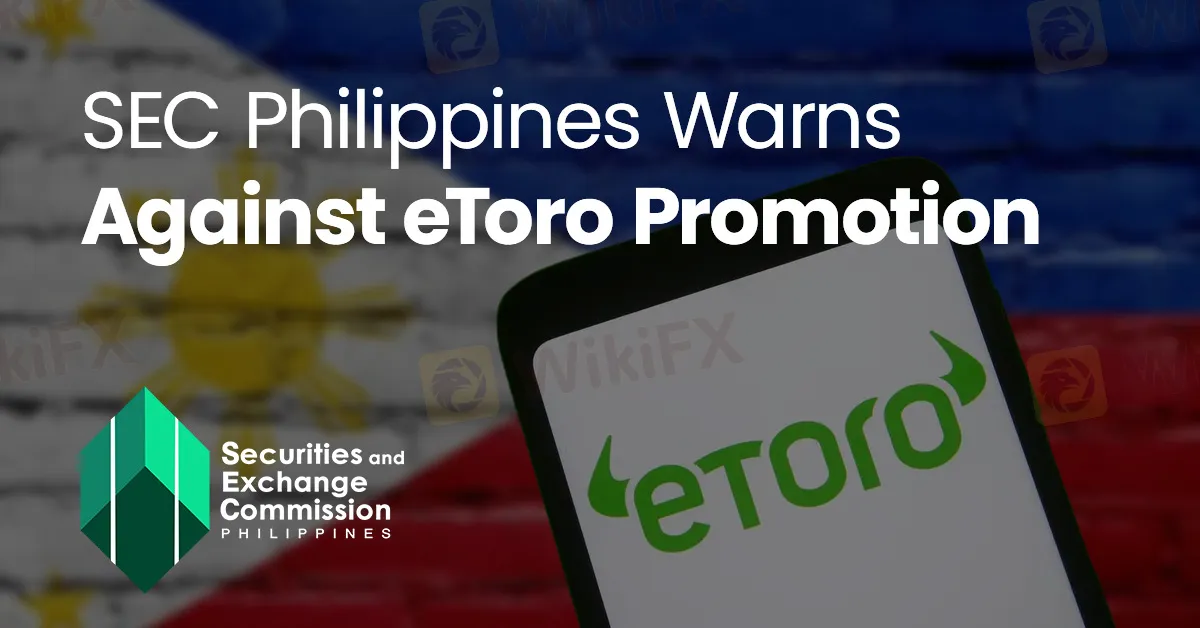简体中文
繁體中文
English
Pусский
日本語
ภาษาไทย
Tiếng Việt
Bahasa Indonesia
Español
हिन्दी
Filippiiniläinen
Français
Deutsch
Português
Türkçe
한국어
العربية
SEC Philippines Warns Against eToro Promotion
Abstract:The Securities and Exchange Commission (SEC) of the Philippines has issued a stern warning against promoting eToro within the nation due to the broker's lack of authorization, potentially resulting in severe penalties, while eToro denies active promotion amidst regulatory scrutiny.

The Securities and Exchange Commission (SEC) of the Philippines has issued a stern warning, indicating that any individuals engaged in promoting eToro within the nation may face severe penalties. This includes a hefty monetary fine of 5 million pesos, equivalent to approximately US$88,500, or a maximum imprisonment term of 21 years, or possibly both. This cautionary stance from the local regulator stems from eToro's lack of authorization to vend or solicit securities to the public in the Philippines.
This advisory against the broker was initially disseminated by the SEC on March 14 but has been made public only recently, specifically on Thursday.
As per the regulatory guidelines in the Southeast Asian nation, platforms offering investment products and securities must adhere to stringent protocols. This entails ensuring that the securities being offered are duly registered within the country, issued by a locally registered corporation or dealer, and that the issuer possesses a secondary license to engage in the sale or solicitation of securities to the public.
The advisory issued by the local regulator underlines that eToro, as per the Commission's database, lacks registration as a corporation in the Philippines and operates sans the requisite license or authority to market any form of securities.

Consequently, the public is being urged to exercise prudence and diligence before engaging in investments through such unregistered online platforms and their representatives.
eToro, headquartered in Israel, maintains regulatory oversight and registration across various jurisdictions including the United Kingdom, Cyprus, the Netherlands, France, Spain, Italy, Malta, the UAE, Australia, Seychelles, the United States, and Gibraltar. Its offerings encompass a diverse range of assets from equities to cryptocurrencies, and contract for differences, among others. Despite eToro's global presence and regulatory compliance in various jurisdictions, the Filipino regulator has pointed out its absence of licensure within the country, coupled with its active marketing endeavours targeting Filipino investors and facilitation of account openings.
Contrary to these assertions, eToro has refuted claims of actively promoting its services in the Philippines, emphasizing its stringent adherence to regulatory standards across multiple jurisdictions. Meanwhile, eToro is reportedly contemplating an initial public offering (IPO) in the United States following an unsuccessful attempt at a reverse merger with a bank-check company. While specifics regarding the proposed public listing remain undisclosed, CEO Yoni Assia has expressed aspirations for a valuation surpassing $3.5 billion.

Disclaimer:
The views in this article only represent the author's personal views, and do not constitute investment advice on this platform. This platform does not guarantee the accuracy, completeness and timeliness of the information in the article, and will not be liable for any loss caused by the use of or reliance on the information in the article.
Read more

IG Group Enters Direct Investment Market with £160 Million Freetrade Buyout
IG Group, a prominent global financial trading and investment company, has announced its acquisition of Freetrade, a commission-free investment platform, for £160 million. The deal, funded through IG’s existing capital resources, marks a strategic move to expand its footprint in the United Kingdom.

Cinkciarz.pl Under Fire: Frozen Accounts, Missing Funds
Cinkciarz.pl, one of Central Europe’s largest currency exchange platforms, has made headlines after accusing major Polish banks of conspiring to undermine its operations. The company has threatened legal action amounting to 6.76 billion zlotys ($1.6 billion) in damages. However, the platform is now under intense scrutiny following allegations of fraud and the mismanagement of customer funds.

BSP and JICA Renew Partnership to Expand Credit Risk Database for SMEs in the Philippines
On December 11, 2024, a significant milestone was reached in the Philippines' financial sector as the Bangko Sentral ng Pilipinas (BSP) and the Japan International Cooperation Agency (JICA) officially signed the ‘Records of Discussion’ for the second phase of the Credit Risk Database (CRD) project. The ceremony at the BSP headquarters in Manila marked a pivotal moment in widening access to financing for small and medium enterprises (SMEs) across the country.

Why Copy Trading is Perfect for New Investors
Learn why copy trading is ideal for new investors. Follow expert traders, minimize risks, and start earning confidently—no prior expertise is required.
WikiFX Broker
Latest News
How Long Can the Dollar Remain Strong?
Forex Price Trend Prediction! | Come be a New Year Price Winner!
HFM NY Special Offer!
How a Promised RM1.4 Million Return Turned into a Costly Scam
Cinkciarz.pl Under Fire: Frozen Accounts, Missing Funds
First Unfair Trading Case Reported Under South Korea’s Virtual Asset User Protection Act
“Predict and Win” Big Rewards! Join the Contest Now
"Jumped Deposit Scam": New Wave of Financial Fraud in India
South Korean President Yoon Suk Yeol's Arrest Shakes Markets
Titanium Capital LLC Ponzi Scheme: Henry Abdo Admits Fraud, Impacting Over 200 Investors
Currency Calculator






